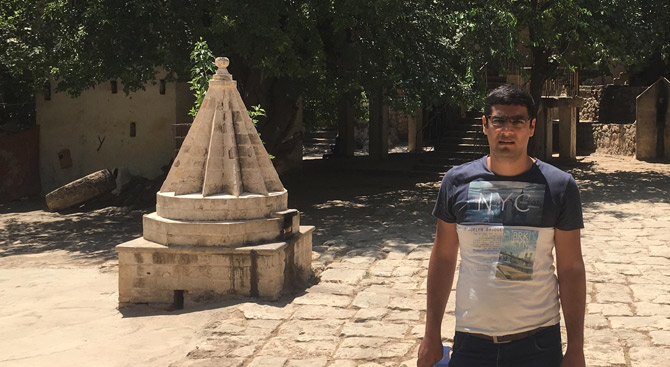
President of Yezidi Organization in Armenia Travels to Iraq: Points to Uncertain Future
Hetq recently spoke to Boris Mourazi, who heads the Sinjar Yezidi National Union in Armenia. Mourazi travelled to Iraq to better understand the plight of Yezidis in the country.
Why Iraq?
The first reason I came to Iraq is to better understand the plight of the Yezidis and the overall situation. In 2013, when I and twelve friends mad a pilgrimage to our holy shrine, Lalish, we decided to strengthen our ties to this place.
After the 2014 genocide, we felt even more obligated to assist our brothers. It’s also clear that to remain here for a long time, we need to work, and we do, which gives us residency rights.
I also want to use my experiences in Iraq back in Armenia; to deepen ties between Yezidis in Iraq and Armenia.
Did you travel to Iraq on your own?
I was accompanied by Artour Atashov, from our organization.
You’ve been in Iraq for five months now. What region are you in? What work do you do? What the overall situation in the country?
Our permanent place of residence is Erbil, but we travel around. We’ve been helping a French-Armenian director shoot a documentary on the Yezidis these past few months.
From a military viewpoint, the situation is calm. But there’s political tension between the Iraqi national and Kurdish governments, and between the Yezidis and Kurds. To top it all off, there’s the threat of a Turkish military assault in the direction of Shanhgal. (Also known as Sinjar/Shingal, Shangal is a town in northern Iraq, mainly inhabited by Yazidis)
What are the consequences of this political tension? Does it threaten the wellbeing of Iraqi Yezidis?
The political tension is linked to the Kurdish referendum and the Iraqi national government’s military operations against the Kurds that followed. There’s also the sanctions the government has imposed, including the ban of international flights to Iraqi Kurdistan.
After the referendum, Iraqi forces removed the supervision of Yezidi-populated Shingal from Kurdish forces. Due to the efforts of Yezidi leaders, the transfer was peaceful. Now, however, Turkey is exerting pressure on Shingal. As a result, Yezidi fighters in the Kurdish Workers Party (PKK) who had come to Shingal during the 2014 genocide, have left the region on the demand of the Iraqi government. It appears that Turkey wants the Iraqi government to assume total control of Shangal, even the Temple of Sharfadin, one of the main Yezidi holy sites.
The other domestic political issue is that the Kurds, who are scheduled to hold parliamentary elections in May, aren’t allowing the Yezidi refugees who have relocated to their lands to return to Shangal. Obviously, the Kurds want to control their votes.

How many Yezidis now live in Iraq?
It’s hard to say. There are no numbers as to how many have been killed and how many have left Iraq. There were 1.2 million before the genocide.
How many died because of the genocide?
Around 10,000. The plight of 3,000 women and children is still unclear. New graveyards are discovered all the time.
Your organization’s Facebook page claims that ISIS members are selling Yezidi women. Do you know of specific cases?
They’re the 3,000 I just mentioned. We don’t know if they’re alive, dead, or in captivity.
Have cases of women being sold been unearthed?
Of course. In one case, it was the parents who bought their own children. In another case, the parents of children taken captive couldn’t buy them back, and the kids were sold off in various Arab countries. There are many such cases. We must remember that the number of Yezidi captives surpassed 6,000. Today, Yezidi women are being sold in Turkey and Syria.
Who exactly is selling Yezidi women?
Naturally, they are members of ISIS who captured Shangal in 2014.
What can we expect to see in Iraq?
It all depends on the scheduled parliamentary elections in May. Developments will begin afterwards, and I hope that all Yezidis will leave the camps and return to Shangal.
What concerns you the most while living and working in Iraq?
The uncertainty regarding the plight of Shangal. No one now knows how things will develop in the region. Will the Yezidis return or not? Who will guarantee the region’s security? How will the ruins be restored? The main problem is the lack of answers to the questions you pose.
Photos courtesy of Boris Mourazi
 Videos
Videos Photos
Photos




Comments (1)
Write a comment